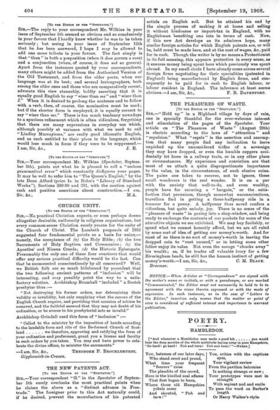THE PLEASURES OF WASTE.
[To TIER EDITOR OP THE "SPECTATOR."] SIR,—" Held up " in a Highland village by days of rain, one is specially thankful for the ever-welcome interest and stimulation of the pages of the Spectator. Your article on " The Pleasures of Waste " (August 29th) is electric according to the laws of " attraction " and " repulsion." What " repels " is the assertion and assump- tion that many people find any inclination to leave unpicked up the unconsidered trifles of a sovereign they may have dropped, or even the humble coppers acci- dentally let loose in a railway train, or in any other place or circumstances. My experience and conviction are that most of us attach a quite disproportionate importance to the value, in the circumstances, of such elusive coins. The pains one takes -to recover, not to ignore, these small wanderers is the real wonder. It is on a par with the anxiety that well-to-do, and even wealthy, people have for securing a " bargain," or the - satis- faction that pecunious, though somewhat unconscientions, travellers find in getting a three-halfpenny ride in a tramcar for a penny. A halfpenny thus saved confers a ridiculous, but quite unholy, joy. There is no sense of the "pleasure of waste" in gazing into a shop-window, and being ready to exchange the contents of our pockets for some of the attractive objects we see exhibited. We may buy foolishly, or spend what we cannot honestly afford, but we are all ruled by some sort of idea of getting our money's-worth. And for most of us there is no sort of money's-worth in leaving the dropped coin to "rust unused," or in letting some other fellow enjoy its value. Not even the savage "chucks away" his wealth ; as, if he trades off valuable ivory for a few Birmingham beads, he still has the human instinct of getting money's-worth.—I am, Sir, &c., C. M. BLACK. Braemar.










































 Previous page
Previous page